Paul is asked if a strong Russia is a positive counterbalance to U.S. global hegemony. Paul is interviewed by Colin Bruce Anthes on theAnalysis.news.
Colin Bruce Anthes
Welcome back to theAnalysis.news. I’m Colin Bruce Anthes, and this is part three of my conversation with Paul Jay on the Russia-Ukraine war.
Welcome back to the Analysis. We’re interviewing Paul Jay on the Russia-Ukraine crisis. One of the defenses of the Russian position has been that the United States owns a huge amount of power internationally that it needs some countervailing power for other people to be able to stand up for themselves. One of the positions that’s been put forward is that Ukraine is going to have an extreme austerity agenda pushed upon it once this war is over, if it’s over.
There was a recent conference in Switzerland that was called the Recovery Conference— the Ukraine Recovery Conference. [Volodymyr] Zelenskyy attended that via video, along with ranking officials from all the major nations, Western nations. The agenda that they were pushing looked a lot like the agenda we talked about in 1990s Russia under Boris Yeltsin.
One of the lines of defense is you have to have powerful countervailing powers in order to push this kind of activity, this disaster capitalism that is constantly being thrown upon nations that are in difficult circumstances and give them some kind of line of defense. So what’s your response to that line of rhetoric?
Paul Jay
Well, there’s absolutely no reason to think that Russia is a line of defense against austerity. You know, Russia is not some social, democratic Scandinavian country. I interviewed Aleksandr Buzgalin, and he was saying if we could ever make it to social democracy in Russia, it would be revolutionary. He called capitalism in Russia; he had this term Jurassic capitalism— the capitalism of dinosaurs. It’s very brutal capitalism with very little social safety net. To think that somehow having a powerful Russia that would in any way diminish what a post-Ukraine would look like, whether it was part of the West or even part of Russia, that’s kind of ridiculous.
The issue of a multipolar world is a bigger conversation. The way it’s posed is that a strong Russia and a strong China is a countervailing power to America as a global hegemon. Thus, some people are arguing, and I would say you get some of this in the Western Left, but it’s maybe even a more powerful argument in the global South that a strong Russia is a critical countervailing power and a strong China even more importantly to American power. I think it’s true and not true.
Let me say, to begin with, it makes absolutely no difference what anyone thinks about whether a multipolar world is a good thing or a bad thing. This is part of an objective process of the development of capitalism. We are in a multipolar world. It’s not up for debate. So have a theory, have a debate, write a paper, have a thesis, and argue with this academic or that academic. Honestly, nobody gives a shit because it’s not up to us. It just is. Is capitalism a bad thing? Yeah. It ain’t going away because we don’t like it.
So there is a multipolar world. Honestly, when wasn’t there? That’s what I don’t get. When was there a unipolar world? It certainly wasn’t during the time of the Soviet Union. So between 1990-2000, it was unipolar? Well, if it was so unipolar, why did India continue to make most of its arms purchases with Russia? If it’s so unipolar, why couldn’t the United States force India to transition to a totally U.S. supply of arms? Even to this day, only recently has the Indian arms purchases from Russia gone down a little bit.
At the end of the Soviet Union, during the final year of ’89-90, the number one trading partner of India was Russia. It was the Soviet Union. Where’s that unipolar world? The United States couldn’t even stop India from having such extensive trade with the Soviet Union, and most importantly, in arms, because there’s nothing more important to the United States than which arms network system you’re part of. I’m not saying the Americans weren’t a hegemon, but let’s be realistic about that hegemon.
Colin Bruce Anthes
If I can offer a little bit of a challenge to that position—
Paul Jay
Yeah, yeah.
Colin Bruce Anthes
Certainly, there have been multiple players the entire time on a very large scale, but who has had the power to organize military coups, to instate disaster capitalism, and to have their major financiers get their fingers in every pie the way the United States has?
Paul Jay
Yeah, of course, nobody. But because you’re the dominant player in global capitalism, even more important because you’re the manager of global capitalism, including reserve currency and such, the power of the Fed internationally, of course, it’s very powerful, the CIA, it’s very powerful. Look at the projection of American military power. One disaster after another, they fought to a standstill in Korea and lost in Vietnam. They were successful in Grenada, and they were able to kidnap the president of Panama. They lost in Iraq. They won the first Iraq War; let’s give them that. They lose the Iraq War where there’s a real invasion. They lose in Afghanistan. I mentioned Vietnam, which is the obvious one. Every major projection of U.S. military power has been a debacle. Let’s not exaggerate the ability of the U.S. to determine the outcome of everything. Every one of these big defeats, with the exception of Korea, was done virtually by the people themselves with very little external support. Vietnam got some support from the Soviet Union but not much from China. However, not a lot from the Soviet Union. Not nearly as much as one would have expected because the Soviets didn’t want to antagonize the Americans. The Iraqis fought and basically won, making the American troops withdraw a little bit of external support from Iran, but not that much. It goes on and on.
In this world, people try to imagine that the Americans are pulling the strings of everything. Did the Americans really want all these left-wing governments to get elected in Latin America? No. They fought tooth and nail to stop the elections of [Hugo] Chávez, [Evo] Morales, and [Luiz Inácio] Lula [da Silva]. The people were fed up with these American-backed dictatorships, and the people demanded democratic elections. Even if the Americans did everything to undermine them, they had some successful coups in Honduras, but in spite of that, people are a factor in history. Maybe, in the end, it will be true that people make history.
The peoples of Latin America are what defied this American domination. The Americans did not use the power of their military. What was it that constrained Lula? It wasn’t a threat of the U.S. invasion of Brazil; that would have been insane. In a million years, the United States would not imagine invading Brazil. They would be eaten alive by the Brazilian people. No, they use the power finance. They threatened Brazil in terms of interest rates, bond markets, and what they would do to Brazilian debt. Also, of course, the Brazilian elite was still powerful, and the role of religion. They didn’t control the outcome of everything.
Imagine this. Who’s the biggest trading partner of Brazil, and I think every country or almost every country in Latin America? China. They are the number one trading partner in spite of no military projection at all. In spite of this global hegemon, they couldn’t even keep China out of their own bloody Monroe Doctrine backyard. The U.S. is not as in control as it would like to be. Of course, the Americans would love to be so in control, but they’re not.
Why does Biden have to go with his tail between his legs to Saudi Arabia? They can’t even control the Saudis. The Saudis just have to hint that they’re going to cozy up to the Chinese and the Russians, and Biden had to rush there and say, oh, please don’t do that. It’s not that they don’t interfere wherever they possibly can. It’s not that the CIA isn’t active everywhere. It isn’t that they don’t use the power of finance to dictate and blackmail. They do, but only with relative success. Sometimes they’re more successful, other times not. In general, they haven’t been as successful as some people suggest. They’re not as domineering. As I said, they couldn’t get India to stop buying Soviet and then Russian arms. This is true in other places as well.
Is it more a multipolar world than it was? Of course, especially in China and Russia too. Russia, as compared to 1990, before this invasion, at least, was certainly a far more powerful entity than it was through the ’90s and in the early 2000s. China, of course, is the far bigger story. It’s part of the Russian story because the more the Russians can depend on China, it helps strengthen Russian support. Even for Russia, to get militarily involved in Syria, where is there another power other than a China? China is too smart to do that. Who else militarily comes close to being face to face with the United States? So yes, this is a more multipolar world than it was.
Is that a good thing? Well, yes and no. It’s a good thing that the countries of Latin America and elsewhere have an alternative to the United States for financing. It diminishes American blackmail because countries can go to China and borrow money. Some people argue that the Chinese are every bit as predatory in loaning money as the Americans are. Let’s assume it’s true. I don’t know if it’s true, but let’s say it is. It’s still a good thing because it’s an alternative to American blackmail, especially in places like Latin America and maybe in Africa and other places. It’s a very useful thing to be able to say to the Americans, we have somewhere else to go, so you can’t screw with us the way you’re used to it.
I would say the same thing goes for Russia. It has nowhere near the capacity of China. The fact that Venezuela was able to buy arms or get some arms subsidy from Russia was a good thing. I don’t think the Americans really had any agenda to invade Venezuela. If you want to stoke Venezuelan nationalism, the people of Venezuela are not shy about fighting for their country and for their people. If there ever were a U.S. invasion of Venezuela, the opposition would have been demolished completely. I’ve been there a bunch of times, and the Venezuelan people would not accept Venezuelan quislings. I actually don’t believe, and the Americans know it, I don’t believe the Americans ever intended to invade.
It’s also an example of the limit of American power. Why haven’t the Americans been able to overthrow Nicolás Maduro yet? I’m no Maduro fan. I, obviously, totally oppose the Americans having anything to say about who governs Venezuela. In fact, I don’t think Americans should have anything to say about who governs anywhere except the United States. It’s an expression of the limit of power of the United States. Even in Monroe Doctrine countries, Latin America, they couldn’t get rid of Maduro, and obviously, they wanted to. So that’s a good thing. Still, it’s a good thing Venezuela could get arms from Russia. It, at least, mitigates the threat of U.S. intervention.
So this multi-polarity has some upsides. It’s not transformative. The people talk about BRICS, the BRICS countries. What is it? Brazil, Russia, India, China, and South Africa. It’s a good thing to the extent those countries can diminish American financial power, to the extent those countries can have an alternative to the World Bank, IMF, which is American-dominated. It’s a good thing, but it’s not going to change global capitalism managed by the United States, certainly not in any foreseeable future.
Look at what’s going on with the U.S. dollar right now. It’s through the roof. All the United States had to do to make the world buy more dollars was add a couple of points of interest on the American treasury bill. All of a sudden, everybody’s buying dollars again. It’s through the roof. All the rest of the currencies of the world, except for Canada because oil is up. We’ll see how long that lasts. Almost every other currency in the world is tanking. Look how little they had to do, raise interest rates. So the global economic system, the capitalist system, is dependent on American management. Nobody in the capitalist world, including the Chinese, wants that to end. The Chinese need the American market as much as the Americans need the Chinese market. The Chinese owned, what is it, a trillion and a half U.S. dollars. They don’t want that to turn into nothing. There’s no alternative that’s feasible on any horizon. It doesn’t mean there couldn’t be a new currency created for trade between Russia and China, and maybe some other countries, but it’s going to be very limited for this historical period.
Now, it can change if you get a [Donald] Trump or Trumpist elected in ’24, and whoever he or she is, probably a he, is going to be as crazy or crazier than Trump. They’ll start to play out Steve Bannon’s dream of a war against China, at least a much more serious economic war. It puts China in a corner, which China is already preparing for. A lot of other countries are thinking this through now, including European ones. They may say, you know what, as disruptive as it’s going to be, we can’t play in that world where the Americans control our finance, and we’re so damn big we don’t have to. So maybe we’ll take our medicine and start to decouple from this American-dominated capitalist system. It’s possible. I don’t see it happening as long as the majority of the elites, financial elites represented by the Democratic Party, as long as they control foreign policy and economic policy, I don’t see it happening. The BlackRocks’ of this world are increasing their investment in China. Apple is, and others are. You don’t give up on a billion-and-a-half-person market unless you’re a fanatic. The fanatics may come to power in the United States. They did in Germany. Why not in the United States? I don’t see that happening.
So we’re looking at a multipolar world within capitalism managed by the United States. Now, here’s the rub. I’ve given some pluses of the multipolar world. Here are the not pluses. Regionally, the major powers, even if they’re in contradiction with, even antagonistic contradiction with the United States, it doesn’t mean they can’t be their own villains in their own regions. As progressive people, we have to be able to say, just because you’re fighting against a regime that’s anti-American, we aren’t going to condemn you as being puppets of the United States.
I was in Georgia, the country, not the state, after Russian involvement there. I talked to a lot of Georgians, and the progressive Georgian’s position was no to NATO, no to the West, and no to Russia. That was the progressive position. They supported the overthrow of the [Mikheil] Saakashvili regime, Saakashvili government. They wanted the pro-American government out. They were condemned as being pro-U.S. In fact, it’s happening everywhere. Some of the Left was condemning the uprising in Cairo as being pro-American just because [Barack] Obama and the Americans had their own reasons for sympathizing with it.
There are a lot of things I don’t agree with Mao Zedong about, and there are some I do. One of them was people have a right to rebel against reactionaries. Yeah, it doesn’t matter where you are, and it doesn’t matter whether your government is anti-American. If it’s a reactionary government, if it’s repressive, if it’s a police state, people have a right to fight it without being accused of being American puppets and all the rest. Some of this is Russian propaganda or propaganda coming from.
To the Chinese people, if they want to fight against the Chinese Communist Party, and this is very important, of course, the CIA will be there and are there. Of course, the Americans will try to manipulate these struggles in their own interests, and people should not fall for that. In Libya, there was a great banner on a building at the very beginning of the war, the invasion of Libya, when all these threats from Muammar Gaddafi were going on against Benghazi. There was this banner unfurled on a big building in Benghazi, and it said no to NATO, and no to Gaddafi. There was another one that said, NATO stay out.
There was a real uprising in Benghazi where people were organizing to resist the Gaddafi government, but they didn’t want NATO. Now that was crushed. The NATO countries, led by France actually, this is another interesting thing about multi-polarity, because the French were the ones that led the invasion because of TotalEnergies oil interests in Libya, and that was crushed. People condemned, some people on the Left condemned that resistance to Gaddafi as just being pro-American. Why can’t people fight against the Gaddafi dictatorship without being pro-American? I mean, they can and they should, but they shouldn’t do it as puppets.
Now, here’s where it gets complicated, and I’m a little on the fence here. There are people like Gilbert Achcar, who’s a progressive academic and lives in England now. He says if you’re going to support people’s right to fight against Gaddafi or, in the current situation in Ukraine, to fight against a Russian invasion, you also have to support their right to get arms wherever they can. So you got to support the Libyan people’s right to get arms. Arms only. Not troops, he argues, not bombers, but arms. His argument is if the people get arms but no bombers and no foreign troops, then, in the end, they end up with guns, and if they win, they win, but in theory, without foreign control.
The reason I’m on the fence on that is that, in some ways, the principle, I think, is right. Imagine the French partisans fighting [Adolf] Hitler and say, oh, no, you can’t get arms from England or the United States. No, you got to fight without. Who was the worst, biggest, vicious imperialist in the world prior to World War II? England. Anglo-imperialism, colonialism, and imperialism up until its essential demise after the end of World War II, over 300 years, apparently killed 1.5 billion people. In the history of war crimes, Britain takes the prize. Even the United States pales in comparison. Now you’re going to tell French partisans you can’t take weapons from the British because the British are the worst colonialists and butchers in the world? It’d be ridiculous. You can say it if you’re not living in France and occupied by fascists. Life is complicated. It’s not so simple, and people like to simplify it, but it’s not so simple. The day may come when a Russian state or an American state can become so fascistized that we have two relatively fascist states at each other. We’re heading into crazy times.
Colin Bruce Anthes
Yeah. I’m going to go into one more pessimistic note or dark note before we go into what could be a better path forward and how we can start to articulate goals, public goals, that people are demanding of their politicians as well, that can maybe lead us out of this crisis somehow. It’s a very difficult crisis to get out of. First, I do need to bring in one other complication. This has come up in some of your past interviews as well. A major war like this could very well turn into a long war. It can serve as cover at a time when we have both an economic downturn right now and an escalating climate crisis that either the catastrophes of or the solutions are going to have to be paid for and to do so within an austerity framework for the average citizen. If there’s a war going on, these are cuts that are necessary. This is austerity that is necessary in order to fight for justice and basically to use the better angels of our nature as a justification to put people through the wringer. Can you speak to the degree to which crisis there’s an incentive for major powers that are aligned with big economic powers, especially big oil, to continue this war? You said it’s covered for austerity for the masses.
Paul Jay
Yeah, well, of course, I agree with all that. Who are the winners so far of the war in Ukraine, the Russian invasion? Clearly, it’s the fossil fuel and the arms manufacturers. Fossil fuel and arms are two of the largest sectors of the Russian economy, disproportionately so, and major sectors of the American economy, not as disproportionately so. The American economy is more diversified. It’s not as dependent on fossil fuels and arms in terms of the GDP. Fossil fuel and arms play a disproportionate role in politics because of the bribery, campaign financing, control they have over Congress, and the role of nationalism in the American narrative.
It’s very interesting that the Christian nationalists, when they march and organize, it’s not just against abortion. I’ve seen some of these marches being overtly pro-fossil fuel. What that has to do with a conviction of being against abortion beats me, except that we know that a lot of the money helping drive Christian nationalism is fossil fuel money and military-industrial complex money. So it would not surprise me at all that when [Vladimir] Putin does his calculations about whether to invade or not, he looks at how this is going to impact the price of oil. Even if he underestimated the extent of the sanctions, he knew that Europe couldn’t not buy Russian gas. It had to. An American Ambassador— this came out of WikiLeaks at the time of the Libyan war. He said Russia had an energy noose around Europe’s neck. Boy, he was right; they do. Putin knew that.
Of course, the American fossil fuel companies are very aware that a Russian invasion of Ukraine would lead to an enormous spike in oil prices. The American arms manufacturing, of course, knew billions of dollars go into Ukraine in arms. Oh, yeah. Whose arms are they buying? Obviously, it’s mostly American, although I’m guessing the European arms manufacturers have a piece of the action.
Does this consciously go into the making of plans both on the American and Russian sides? It must. I don’t know if you can see it in the Foreign Affairs journals, but it’s impossible that fossil fuel companies, others, and their representatives in the American Pentagon and the State Department, and the White House, it’s impossible that they don’t look at, well, what’s this going to do to the price of oil? There will be contradictory interests.
Biden, the Democratic Party, and whole sections of the economy that don’t benefit from the high price of oil don’t like this. Of course, the fossil fuel companies do. The arms manufacturers do. So there are lots of competing interests here. The stock market was flying, and then the Ukraine war went down, then it went back up. There is tons of money being made during this period. It’s not a coherent strategy, but yes, of course, certainly in Russia, it’s a distraction from the problems.
Here in the U.S., and I would say Canada too, very soon, I should say very quickly, people actually could care less about what’s going on in Ukraine. It’s become an abstraction. [Boris] Kagarlitsky says it’s true in Russia too. He says there’s very little coverage on Russian TV about the war. Putin’s deliberately recruiting soldiers from small villages and towns, not from the big cities. For a lot of people, it’s a real abstraction.
I saw something similar when I was in Israel. Most Israelis weren’t thinking at all about the occupation and what was going on in Gaza. Maybe for a few days when the war is on, but then after that, it goes back to being an abstraction if you don’t have a kid in the army. Most people are preoccupied with their day-to-day lives.
I interviewed a guy that grew up in San Francisco, a black guy in World War II. He said if you didn’t have someone in the army in your family, you were barely aware there was a World War II. He said we were just fighting to get through the day. We were trying to pay our rent every month. He said it was a complete abstraction. We imagine the entire country was at war. Maybe at some point, you couldn’t buy this or that. Ukraine is not that much of a distraction anymore in terms of American public opinion. Biden just has to look tough on standing up to Russia in terms of his domestic politics; that’s about it. Most people couldn’t give a damn.
The real, more serious problem here is in terms of distraction. Whether this is deliberate or not deliberate, to some extent, it is because of how much this power comes from the fossil fuel companies. It is the complete diminishing of the conversation about the climate crisis. That, for me, is actually the most important thing there is about this whole thing. I would say to the Ukrainians, another argument about why they should make a deal, in spite of the fact they’ve lost so many people, is because if there isn’t a deal made over the war, there is no chance of a deal made over climate change. If there isn’t a deal with Russia, China, the United States, and then everybody else on dealing with climate as a global emergency, we are toast.
I’ll repeat this very quickly, but we’re going to hit 1.5 warming in less than ten years, in all likelihood. In all likelihood, maybe 20 years, 30, maybe, we could easily be hitting 2, and then we’re into 3-4. We’re on a planet that’s unlivable within this century, certainly for most people in the Southern hemisphere, with extreme weather in much of the Northern hemisphere. Where are all these people in the Southern Hemisphere going to go other than north? If we’re not addressing that and immediately taking steps to get off fossil fuel, plant a zillion trees, and give up on illusions of geopolitical geoengineering. Give up on the dream of some magic bullet geoengineering technology. Although I’m not against investing some money to look at it. Maybe there’ll be something. Let’s assume for now there isn’t, because right now there aren’t other than tons of trees, which is ridiculous we’re not at least doing that. In fact, we’re cutting down more trees than are being planted.
So I would say to the Ukrainians, honestly, your problems of sovereignty aren’t as important as having a livable planet. We’re in a time frame where you, on behalf of the planet, but on yourselves, Ukrainian children are going to grow up in the same climate catastrophe as the rest of us. Have your sovereignty in an unlivable world; what does that sovereignty mean? Nobody’s talking about it. As far as I can tell, I can’t even find a glimmer of that conversation in Ukraine. I understand why. When you’re being invaded, thousands of people are dying, but that is the truth of it.
What is this issue of America has to stand up to Putin? Why? For prestige? For geopolitical influence? Yeah, prestige and influence over what? An unlivable planet? I mean, it’s insane. It’s totally insane. This capitalism is at the point of utter irrationality.
So what should progressive people do in solidarity with Ukraine? Demand a resolution of this. Compromise, yes. End the killing. End the war. Do your best to get back to or as close to February 23 borders as you can. Try to insist on as much as you can. The Ukrainians don’t have much leverage here but try to make climate part of the conversation and make clear declarations.
They’re already starting this. Apparently, Kagarlitsky says one of the most popular politicians in Ukraine right now is really pushing back against Ukrainianization and any discrimination against the Russian language. In solidarity with Ukraine, we should support that. Yes. No discrimination against the Russian language. No discrimination against Ukrainian culture in areas controlled by Russia. Make progressive demands. Let’s be clear, humanity is at stake here. We haven’t even talked about the threat of nuclear war, which is certainly heightened under these situations. Climate is a for sure. It’s not a risk. It’s a for sure. So we have to say to the Ukrainians, as part of humanity, we need to get this war over and demand a deal between Russia, China, and the United States on fossil fuel.
What does that partly mean? It means a Marshall Plan where the United States, Europe, and China help Russia transition from fossil fuel. Of course, they better do it themselves for it to have any legitimacy.
Colin Bruce Anthes
I think it’s a very important part of the conversation. It’s from the mainstream media that I have seen in Canada and the United States and not currently factored in at all. There really is the line that, as you put it, on your programming before that this is being fought down to the last Ukrainian, or it’s being set up to be fought down to the last Ukrainian. Do you see breaks in that narrative that are going more in the direction you’re talking about happening in Canada, the United States, and in Western countries that are currently propping up an agenda of war down to the last Ukrainian? Do you see breaks in that?
Paul Jay
Yeah, maybe. There are increasing news stories and such about how the sanctions aren’t hurting Russia as much as they thought it would and how the energy situation in Europe is worse than they thought it would be. Inflation is being driven higher than they thought it would be by high fuel prices, and the food emergency in the Middle East and Africa is worse. There are a lot of stories in the press now about the downside of sanctions against Russia.
To me, that reflects, one, it reflects reality. Two, maybe sections of the elites and the population are losing some of their appetite for this hyper-aggressive stance towards Russia. I know for Ukrainians, this will feel like a betrayal. Still, I’ll say it again, it’s not worth dying for a section of the Ukrainian oligarchy, and it’s not worth the Earth dying because nobody will seriously address climate. What’s been happening with inflation and the energy crisis in Europe? They’re all going back to increasing their fossil fuel use. They’re giving up on some of the green strategies. Even though the obvious strategy to get off Russian gas is green. They can’t do it fast enough, so they’re going back to more coal.
The U.S. is talking about more coal even though there are tons of oil and gas in the United States. Whatever modest, pathetic, weak climate strategy there was is getting demolished by the consequences of the invasion and the sanctions. So I would say, in solidarity with the Ukrainian people, you’re part of humanity, and we as humanity got to deal with the climate crisis. What I would say is to end the war, use the crisis to overthrow the Ukrainian oligarchy, create a really democratic Ukraine and become a model. You’re going to have to rebuild. The country is, to so much extent, destroyed. Well, what about a green rebuild? Not an IMF, austerity rebuild. What about a green rebuild and asking the world to come help rebuild a green Ukraine? A green democratic Ukraine. Now that’s something to fight for.
Colin Bruce Anthes
I think a lot of people would love to join that effort. I think that’s a great place for us after a very difficult conversation; that’s a great place for us to wrap up. Thank you so much, Paul, for delving into this difficult terrain and for addressing a lot of challenges and a lot of different perspectives. Thanks, everybody, for putting your two cents in and giving us something to respond to. Thanks for tuning in.
Paul Jay
Great. Thank you, Colin.
Podcast: Play in new window | Download | Embed
Subscribe Apple Podcasts | Spotify | Android | iHeartRadio | Blubrry | TuneIn | Deezer | RSS
Never miss another story
Subscribe to theAnalysis.news – Newsletter
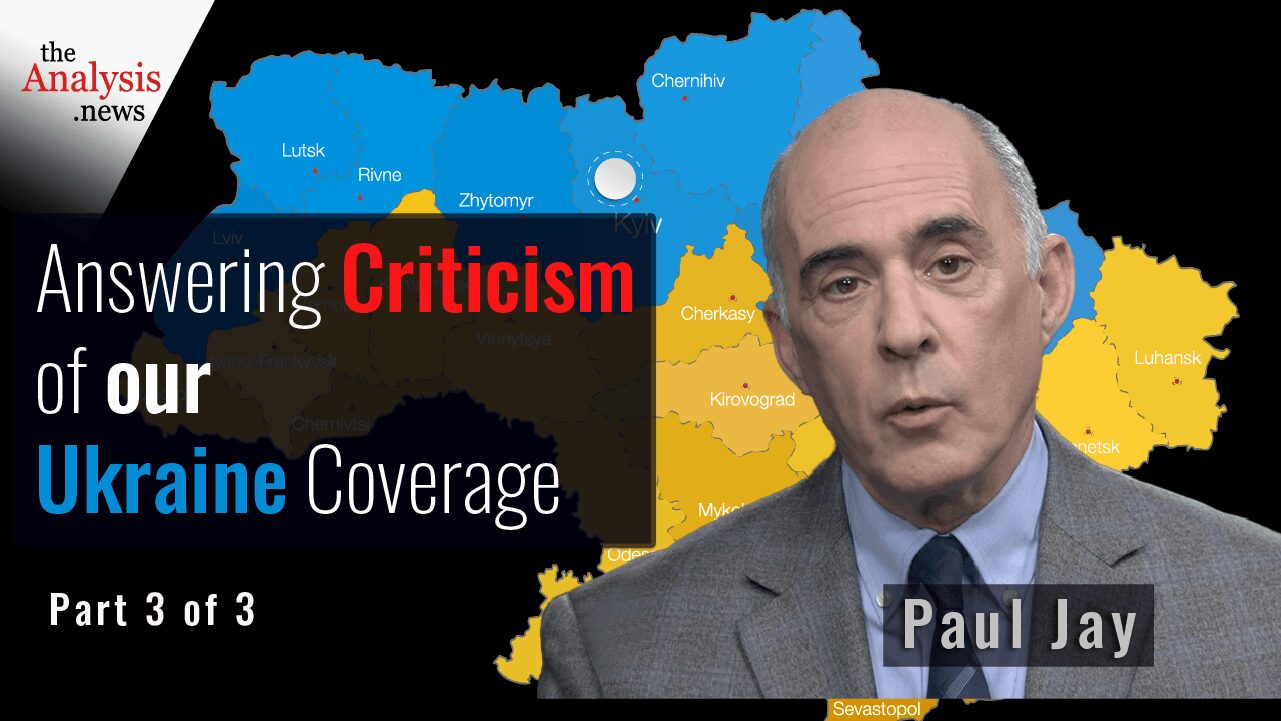
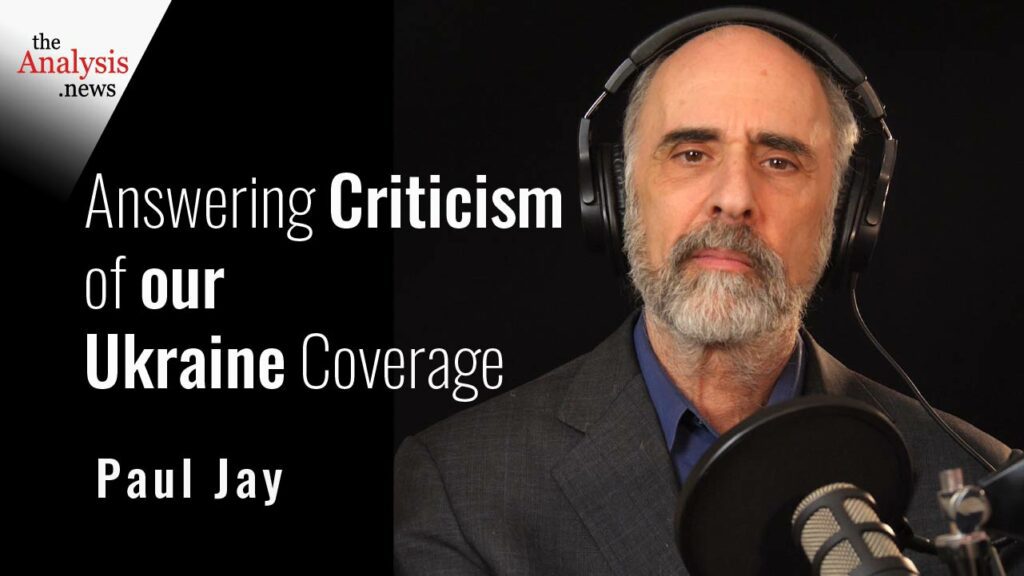
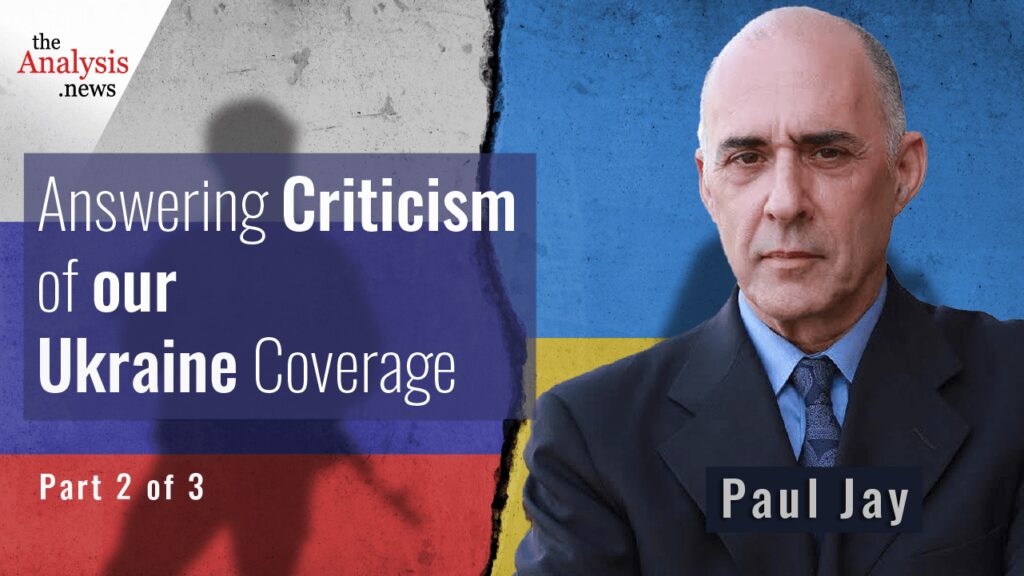
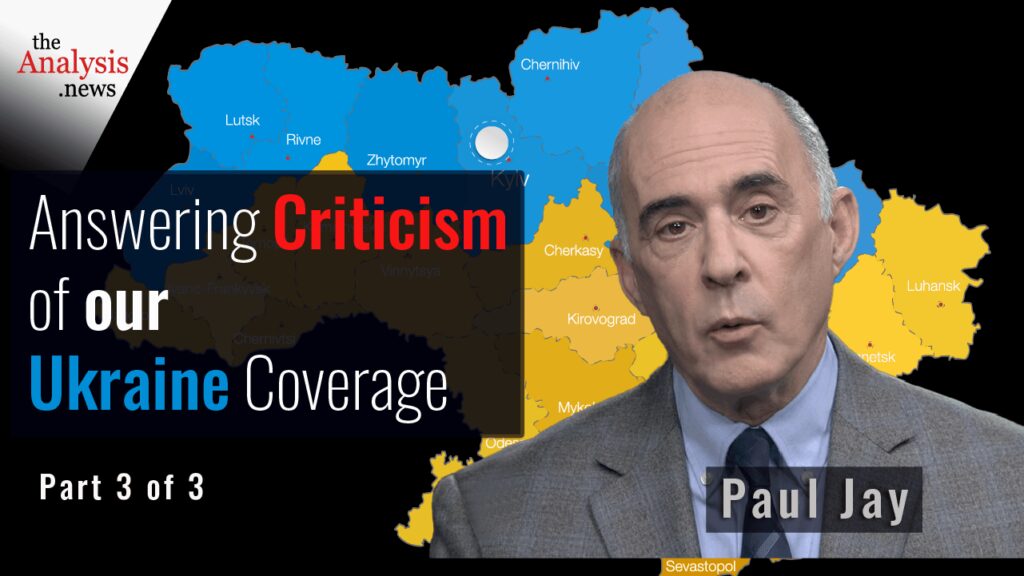
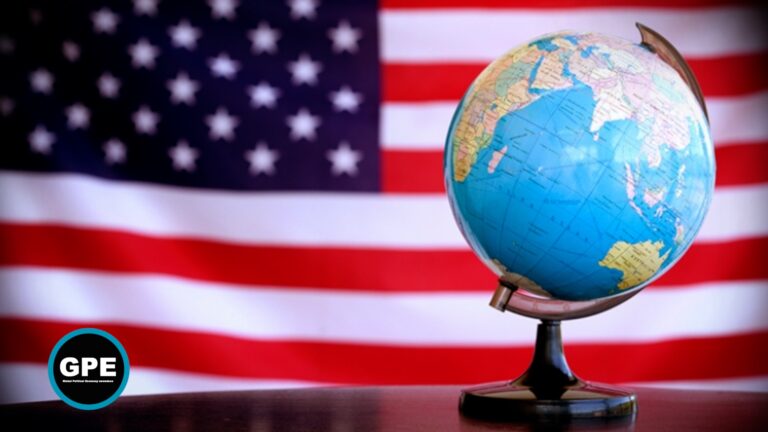
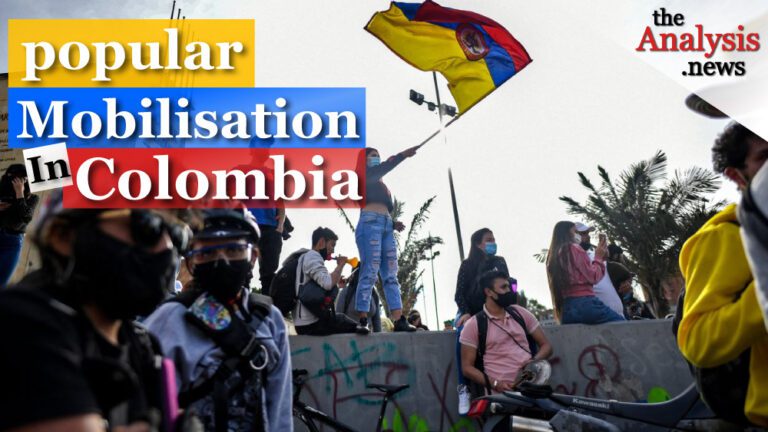
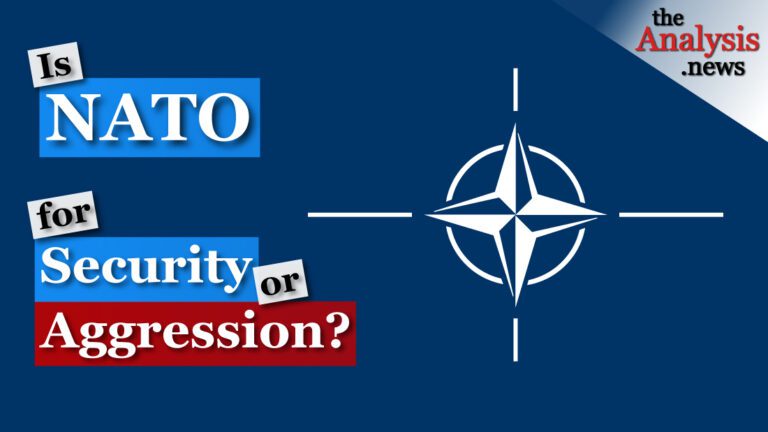

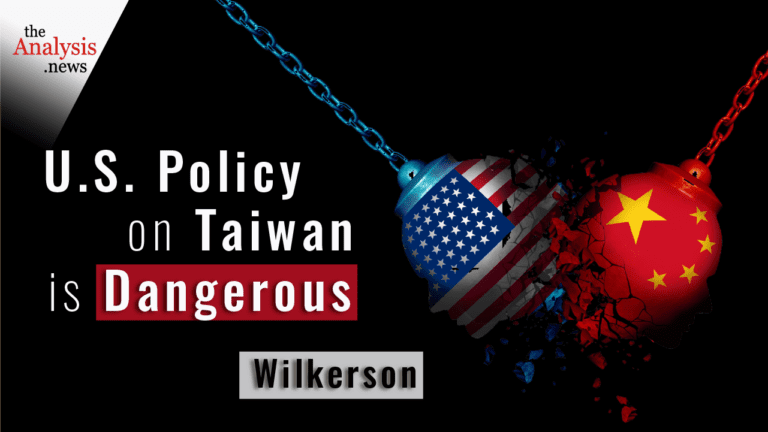
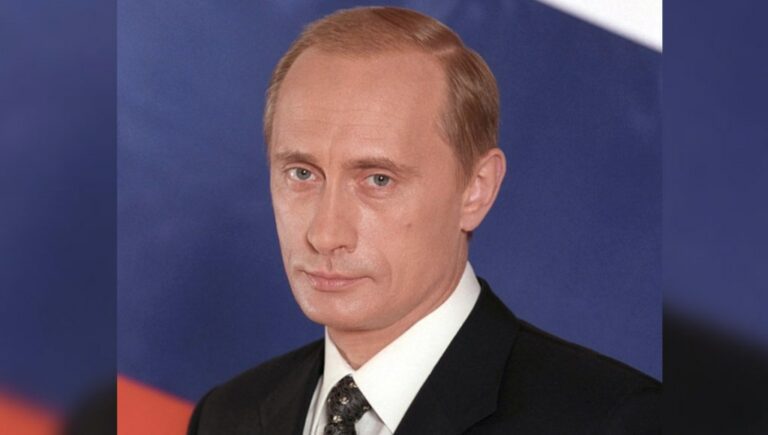
How anyone can expect Russia to yield the advantage and power that their fossil fuel resources provide them, I could not say. The reality of the impending climate catastrophe is not influential in any major capital, let alone Russia’s. The plutocracies of the world – there are no democracies of any consequence – think that they can protect themselves by means of their wealth. Possibly, for a while, but it will be a bleak future on earth even for them.
I really don’t see why Paul Jay has to justify anything about the stance he’s taken on the Ukraine conflict. It’s entirely reasonable to condemn ‘both sides’ in this unfolding disaster. An invasion is an invasion, the terms are quite clear in international law, and to argue otherwise is as absurd/outrageous as to write a revisionist history of the German invasion of Poland in 1939 describing it as an ‘intervention’.
And in fact, if you call yourself a true socialist, communist or revolutionary, you should in fact condemn both sides and there’s a pertinent historical precedent for it, as many of our so-called ‘modern leftists’ have forgotten in their rapture over ultra-nationalist Putin the stance of Lenin himself (and a few principled others) during World War 1. A ‘smaller imperialism’ is still imperialism, pure and simple. And perhaps these same ‘leftists’ have forgotten that Russia is no longer the USSR, but an openly capitalist power just the same as the US, the EU, and China. In fact all nation states the world over with one or two exceptions are either openly imperialist if they have the means to be so, or they would be if only they were powerful enough. This is the nature of the capitalist social relations that underpin all nation states – such relations and the class struggles therein create the kinds of elites that are appropriate to containing them. This is very basic Marx, in fact the ABC, yet one that most modern leftists seem to have forgotten. ‘Whatever happened to class?’ could be another topic Mr Jay could consider covering – that the duty of conscientious revolutionaries is to the working class regardless of its country of origin, and not to ‘defending’ geopolitical entities and their (inter-capitalistic) manoeuvrings for relative advantage.
Let’s be quite clear here: The invasion that was to be ‘all be over in a few days’ was botched by its own idiotic hubris and is now bogged down. Ukrainian and Russian workers are busy slaughtering each other over a political impasse that bears a clear metaphorical analogy to the mud and blood baths of 1915-17 Flanders. The war (as in all wars except the class war) is not being waged in the interests of the working class, but to satisfy the agendas of their elites, some local and others more distant: cabals of rival politicians, oligarchs, fossil fuel extractors and arms manufacturers. It’s pointless recommending sensible policies of deescalation to such people, as if they’d listen to us anyway (ha!). They’ll do whatever they think is in their class interests to do, whether that’s to escalate/deescalate or ‘make peace’, regardless. If we’re to encourage anything positive there it should be for soldiers to mutiny and shoot/frag their officers (or even run them over as some angry Russian common soldiers seem to have ingeniously come up with). This should be what we encourage to take place in any inter-capitalist or imperialist war, alongside refusals to obey instructions/fight, sabotages of industry, strikes and workplace/land occupations by grass-roots assembles of the working class.
Perhaps as a final pointer to Paul for future related enquiry and discussion in relation to this topic I’d suggest taking a revisiting look at two non-Bolshevik revolutionary movements that arose out of the Russian Revolution of 1917. One is the Makhnovist movement of the Ukraine, whose black banner read ‘Death To All Who Oppress The Working Class’. This is very relevant to now, as is to why its memory was obliterated first by a combination of fascist and CPSU interests, and that continues today under the red/white/blue/yellow-washes of competing Russian and Ukrainian nationalisms. The other movement worthy of exploration is that of the Left SRs (Socialist Revolutionaries), former partners of the Bolsheviks from 1917-18, and why they too have been effectively erased from history. One could argue that had these two movements been allowed to survive, the Russian Revolution might have turned out very differently, and perhaps there’s something we can learn from them relevant to the need for a massive internationalist proletarian uprising today – before the capitalist class manage to wipe everybody on the planet out.
Dear Sir Willie, “International law” is, with Biblical law, the frailest of all law because they both lack authority. The authority of Biblical law is God, who never comes down to enforce it. As John Mearsheimer tells, there is no authority to enforce international law to whom injured parties may appeal. All nations must rely on their own power or that of their protective hegemon in their conflicts with others. You compare the Russian invasion of Ukraine with the German invasion of Poland in 1939, as if all invasions are created equal – by international law. Hardly! Some are aggressive, seeking an expansion of power (the USA’s and NATO’s); some are defensing, opposing that expansion of power on its eastern border.
Similarly, not all capitalist societies are equal. Some act in ways that build a nation (Russia, China); some act in ways that destroy it (USA).
Even further, not all blood-baths are equal. Some are the consequence of military folly, as in WW1 and in the present Ukraine; some are avoided as in the Russian slow, prepared offensives in the Donbass.
Of blood-baths, nothing the world has seen would compare to the reaction by capitalists to a “a massive internationalist proletarian uprising”.
Don’t get the inequality of blood-baths argument. US apologists would argue that the US is only ‘acting defensively’ and ‘building the nation’, as would Russian or Chinese apologists for their own state policies. What is a nation? Perhaps you might explore the demolition job by historian Eric Hobsbawm on the whole concept. It’s quite thorough. Any state is simply the means for mediating the capitalist-social relations as they manifest under its administration (this can be authoritarian or more ‘enlightened’ according to the balance in the struggle, but always for capital, never for the workers). This is why workers have to destroy the state to fully free themselves.
I also disagree also on the ‘uprising=bloodbath’ fear. There wouldn’t be a security force on the planet able to put down a properly co-ordinated insurrection by the working class worldwide. Remember ‘uprising/insurrection’ does not necessarily mean riots, though this would likely be unavoidable, and is also one means for the oppressed to achieve confidence in their own human agency on history. It can mean just refusing to obey orders, downing tools and/or taking over the means of production, en masse. The capitalist class will naturally be terrified and try to do all they can to reassert their rule, but if it is coordinated in a mass action then it will be irresistible.
Imagine what might have happened in 1914 had the ‘leaders’ of the world social democratic parties and the trade unions done what was required of them at that moment instead of what they imagined would advance their careers? If the workers’ movement is self-organised and led from the base through delegation, then this sort of sell-out won’t happen. Many leftists remain unaware that 1917 in Russia was propelled from the base (factory committees, land communes), and the political parties/trades unions were consistently playing catch-up and trying their best to limit/restrain the workers’ ambitions (yes, even the Bolsheviks).
Paul:
You are ultimately prescient, that whatever the alignment of world power in the years to come, whatever wars are fought, nuclear war and climate change will end any imperial aspirations for all elites in all countries. If we avoid the immediate threat of nuclear war, climate change and the end of agriculture would be like a slow motion nuclear war.
It’s clear to me that the wealthy will sacrifice the poor when climate change collapses agriculture worldwide. But eventually, the chaos will pierce whatever bubbles they have surrounded themselves with, explained in a recent article by Chris Hedges, who talks about the Cahokia civilization: https://scheerpost.com/2022/08/17/chris-hedges-we-are-not-the-first-civilization-to-collapse-but-we-will-probably-be-the-last/
The kind of media attention given to Ukraine or Covid is the kind of attention and education about climate change that needs to happen. If there is any way, via mass disruption like Extinction Rebellion, or finding a way to convince govt and business leaders and the media to pay attention to this issue, we need to help make this happen if we care about the natural world, our children and children seven generations from now, as the wisdom of the Iroquois shares.
I find more and more similarities between Pakistan and Ukraine. Both have awful military quasi-dictatorships: Pakistan uses forced disappearance, and Ukraine uses torture. Both are reliant on US weapon sales because of an historic animosity between themselves and their neighbour: for Pakistan it’s India, for Ukraine it’s Russia. Yet, whilst everyone seems to recognise that the India-Pakistan conflict does not stem from US Imperialism (rather British Imperialism), there seems to be a lack of awareness that the Ukraine-Russian conflict is not merely due to US Imperialism (actually it has is roots in Russian Imperialism). You see this kid of conflict also emerge in the Sino-Soviet conflict. Actually, in Edgar Snow’s /Red Star Over China/, he interviews Mao in the late 1930s (before Mao became Mao), during the first stage of the CCP-KMT civil war. Mao condemns Stalin for his treatment of ethnic minorities, and likens its to the way blacks are treated in the USA. Snow retorts “[sic] no, I assure you we’re much worse”. So a USA journalist is telling Communist Mao that the USA treats its ethnic minorities far worse than Stalin XD.
Probably the lack of awareness of these subtleties is due to the suppression of talking about the Sino-Soviet conflict and other inter-Communist bloc disputes, because of the need to create a simple, evil, monolithic enemy during the Cold War.
Albert:
The heart of many recent, world conflicts is the US (and its allies, former European imperial powers, especially France and the UK) trying to sow discord and weaken any potential rivals. Small countries that band together to form alliances and any cooperation is seen as a threat: consider how Indonesia lead the Non-Aligned Movement in the 1960s and found itself the target of a coup and genocide shortly after.
…
If we were to look at the Taiwan crisis, very similar to the early stages of Ukraine, the US is trying to isolate China by forming alliances and making regular provocations. Should China take the bait and invade Taiwan on some pretext, the US media would howl to the moon about Chinese aggression. The thing is, Taiwan is heavily integrated with China and the world economy, as is the United States. Should the US cut off trade with China it would be devastating for the West, as the US in particular has de-industrialized and moved much of its manufacturing to China. As an example, Foxconn the (in)famous manufacturer of the iPhone on mainland China, is a Taiwanese company!
The US wants to treat China, and all countries really, like Russia in the 1990s where its multinationals can strip resources and keep the media diverted away from the robbery. Both China and Russia have long histories of foreign invasion or occupation, and want none of it. Professor Dan Kovalik and Naomi Klein have argued that “Disaster Capitalism” is the form of colonialism the US practices: destabilize a country so you can strip its resources and you don’t have to invest money in building a nation (other than laundering money to your own companies, like in Iraq’s “reconstruction”). A quote from Kovalik’s book “No More War”: ” ‘Vulture capitalism’ is indeed too kind a term for this type of creative destruction, for vultures feed on carrion that is already dead; in this case…the US creates the carrion for its corporations to feed on, and at someone else’s expense.”
Wow, brilliant interview!
What you said about protest movements always trying to be usurped by the CIA is also true of the Tian An Men uprising. There were CIA agents, but the movement was a reaction against the development of crony capitalism in China, and they demanded a return to a purer form of Communism: many protesters held pictures of Mao.
My mother told me that she actually got flak from the government for donating to the movement, and she also participated in a march in Shanghai. Actually part of the reason they migrated was because of their frustration with the response by the govt. at the time.
Tings Chak and Dong Sheng news has some interesting videos about CIA involvement and the origins of the massacre, which didn’t happen in the square but was provoked by the torching of a bus of PLA soldiers, and were basically reprisal killings. This was reported in The Times based on Wiki Leaks cables.
I think much of what you’re talking about relates to an antiquated view of analysing the world in terms of nation states. Instead of dividing the world based on income levels, we divide the world based on national borders. There’s a clip on Twitter of Vijay Prashad talking about the difference between revolutionary time and historical time, in a different context, but I think the concepts are relevant here. When people analyse the world and organise based on nation states, they are using historical concepts, based on historical grievances, and are operating in historical time. When people analyse the world and organise based on who owns and controls stuff, talk about uplifting the most down-trodden both globally and within regions, they are operating in revolutionary time.
Paul:
The industrial capitalism of Russia and China has a much more socialist character than the neoliberal, rentier capitalism of the United States: they all have private ownership, but the financial sector dominates US economic planning, while both Russia and China have nationalized banks and primary industries (like Gasprom in Russia). A guest you have featured, economist Michael Hudson, has written at length on the differences: https://multipolarista.com/2022/05/11/michael-hudson-dollar-sanctions-imperialism/. By seizing foreign reserves and applying sanctions, the US pushing its adversaries to further develop internal industries, decouple from the SWIFT exchange system and create alternative trading networks and commodities exchanges, not denominated in US dollars. The contest is between a neoliberal, globalist project centered in the US and Europe and an independent economic union centered in Russia and China, that at the moment at least, promotes national sovereignty, commonwealth and security, such as the Shanghai Cooperation Organization. If you were a leader in Africa, the Middle East or South America, would you see the future in the predatory capitalism of the US or the win-win investment promised by something like China’s Belt and Road Initiative?
…
You mention that the US has not truely been a unipolar power, unable to control outcomes of its military adventures, or the affairs of neutral countries like India.
India is a unique case, being a former British colony that won its independence in 1947 and wanted to remain neutral, not tethered to another western power.
The US has meddled extensively in the politics and economies of South America, Africa, the Middle East and South East Asia. No other country since 1990 can be accused of being an Empire like the United States: the US is said to have 750+ foreign military bases (Russia 1 in Syria, and China 3). Consider the recent article by Jeffrey Sachs that shows the US involved in 15 wars since 1980 versus Russia (Syria, and I would include Chechnya) and China none: https://scheerpost.com/2022/08/24/the-wests-dangerously-simple-minded-narrative-about-russia-and-china/.
As for military outcomes in Iraq and Afghanistan, consider the Military Industrial Complex is a money laundering scheme that doesn’t really care about victory.
An unresolved or nebulous conflict, like the War on Terror, or a years long low intensity conflict in Ukraine doesn’t make military sense, but it makes financial sense for the corporate players involved. Yeah, there are going to be consequences for the elections or the image of the President if the US loses more conflicts, but the profit centered mindset of US elites doesn’t think in structural or strategic terms. I have listened to observers like Andrei Martyanov, Scott Ritter or Larry C Johnson speak with exasperation and contempt about the competence of US leadership.
Great series. Thank you Paul and Colin.